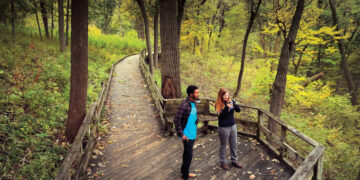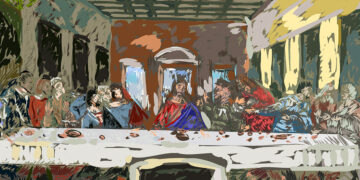Nebraska writer Kassandra Montag grew up with a strong sense of home.
She spent her Arcadian childhood outside Kearney playing in nearby woods and beside a creek. She built campfires and rafts, and stitched clothes together. Adventure stories fed her imagination and the outdoors offered a canvas to reenact these dramas.
“To me, it was a sanctuary because I love to be outside, I love nature,” Montag said. “It brought me a lot of comfort.”
Even as a child she expressed herself in writing.
“I wrote journal after journal. When you are a writer, you’re making a whole world from your mind. There’s this thing about creative people and the way we pay attention to the world around us and are able to transform that raw material into an experience for someone else. It’s part observation, part intuition.”
Then there’s the feeling of “having something inside you that you have to get out.” At 18, while a student at University of Nebraska at Kearney, she found a kind reader in the Nebraska poet Don Welch.
They began a correspondence. “I would drop off some poems in his mailbox and he would write notes on them, critique them, and encourage me,” Montag recalled. “It was incredibly nurturing and uplifting. It meant the world to have someone who believed in me and also challenged me. He was that perfect mentor.”
Working on her master’s at Creighton University, she found another mentor in poet Susan Aizenberg. “Writing is such an isolating career. You need that community and support. It is hard to find.”
That support emboldened Montag to start submitting to literary journals.
After a decade of having her poetry and short stories published, she wrote her debut novel, After the Flood. The book tells a post-apocalyptic tale of a mother’s search for a place to call home.
Within two weeks of mailing queries and sample chapters, she landed a literary agent. “It’s incredibly rare,” said junior literary agent Jessica Spivey on behalf of Montag’s agent, Victoria Sanders. “Within two weeks we are usually just beginning to read a manuscript, not giving an offer.”
rWilliam Morrow, an imprint of HarperCollins, secured the publishing rights at The London Book Fair. The screen rights sold at a Hollywood auction to Chernin Entertainment. “It was really exciting and overwhelming. It’s especially fulfilling to share it with family and old friends because they know where I’ve come from,” Montag said. “They’ve supported and believed in me the whole way.”r
There’s little chance Montag will develop a big head.
“I have two young boys who never let me get ahead of myself. They keep me very grounded.”
The idea for the book came after she and her husband Andrew Baumgartner, a geriatric psychiatrist, returned from The Netherlands, where he’d been studying on a Fulbright scholarship.
“I started having these recurring pregnancy nightmares of a wave of water coming across the Nebraska prairie,” she said. “I had this image in my mind’s eye of a mother living in this future flooded world on a small boat with her young daughter and her other daughter in danger being held somewhere.”
Montag felt she heard the strong, assertive voice of the mother, Myra. “I felt like I knew her personality just from the quality of her voice.”
“Myra is such a force of nature. She doesn’t give up, she perseveres. She’s willing to take risks. I admire that courage. The writing of the book became a journey of finding out more about these characters and what this mother would do in this dilemma. It became a quest of the mother to see her missing daughter by joining a ship of people searching for a safe haven.”
Montag said she did three major drafts before it was ready. It paid off. “The story itself is captivating right from the start,” Spivey said. “Her prose is lush and beautiful. It’s a really timely story as well.”
Montag’s turn from poetry to prose took her far afield.
“This was a huge departure from my previous work of domestic realism poetry and short stories,” Montag said. “This was an epic saga of a family in crisis in a future flooded world. It felt more daring and scary to do. I’d never attempted a project of this scope and quite this action-packed.”
In another sense, she said, it was liberating. “Writing this felt like returning to my childhood love of pure adventure storytelling. It felt really freeing. I felt like breaking away from having to be purely realistic.”
Still, she endeavored to ground her fictional story in fact, balancing her research between survival guides, for practical details, with historical accounts of life before technology.
“I felt like I also carried this memory of what it feels like to fend for one’s self outdoors. My childhood taught me to really pay attention to small changes in the natural world. That led to me being able to write a book in which environment plays such a large role.”
The journals she began as a child sparked a lifelong practice of jotting things down, including inspirations for her novel.
“I love journaling—both as a way to reflect on my own life and to explore influences and new ideas. I’m not as religious about it as I used to be. Now my writing time is spent working on my next book.”
That next book, she says, is a murder mystery set in the Nebraska Sandhills. “I love the Sandhills. It’s a very beautiful, haunting, eerie setting. I knew I wanted to set a book there at some point. I like to write characters with that gritty Midwestern work ethic and perseverance.”
Even with the novel selling well, she says a writer’s lot “is knowing you’ll fail most of the time.” Forget security when rejection is a returned manuscript away.
“You don’t know if you’ll spend two or three years of your life on a book that never sells. But I guess it’s motivating that you always have to hustle.”
She believes many readers, like herself, can identify with Myra’s fierce, maternal mettle.
“So much of the novel is about Myra contending with losses. I think that’s universal. We’ve all lost something or someone. All of us deal with how can we be courageous in the face of loss.”
r
Visit kassandramontag.com for more information.
rThis article was printed in the January/February 2020 edition of Omaha Magazine. To receive the magazine, click here to subscribe.














